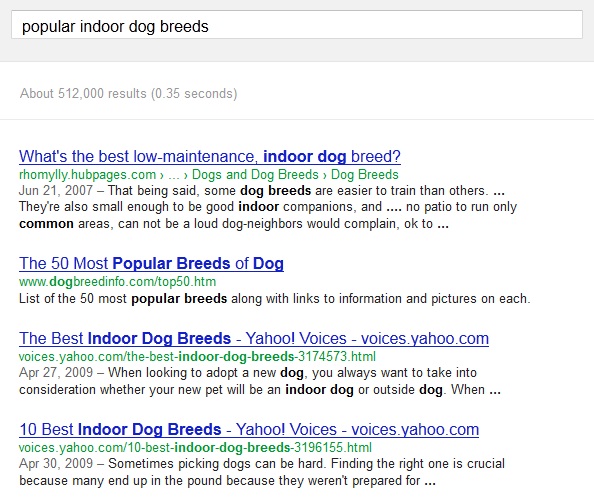Most business owners these days recognize the importance of creating an online presence as a company. Having a website allows your potential customers to quickly and conveniently learn about your products or services, your company’s history, your location and hours (if applicable), your prices, and anything else they’ll want to know before deciding to give you their money. However, your website is only helpful if people are actually visiting it, and that’s where search engine optimization (SEO) comes in.
This article will teach you the basic ideas behind SEO, creating a foundation for understanding the practical advice, how-to information, and deeper SEO concepts presented in the subsequent articles in the “SEO for the Average Joe” series.
Search Engines and the World Wide Web
 The World Wide Web is made up of several billions of individual web pages. These pages cover every topic you can think of and tons of topics you’d never think of. These pages contain text, images, audio, video—a vastly enormous and ever-expanding pool of data in a variety of forms.
The World Wide Web is made up of several billions of individual web pages. These pages cover every topic you can think of and tons of topics you’d never think of. These pages contain text, images, audio, video—a vastly enormous and ever-expanding pool of data in a variety of forms.
Water, Water Everywhere . . .
The sheer amount of information on the Web is awe-inspiring, but the actual value of this virtual library isn’t just the fact that all that information exists: actual value comes when you find the information you need. Sure, there are billions of pages out there, but you don’t want a billion pages when you sit down at the computer and get online. What you want is just a few relevant pages with the information you need. If you know right where that information is, you just type the address (or “URL”) of the desired web page into your web browser’s address bar or click on a bookmark and go directly to that page. That’s easy. What happens, though, if you don’t know where to find what you’re looking for? That’s when a search engine becomes your best friend.
Making the Web Practical
Search engines (like Google, Yahoo! Search, or Bing) play a vital role in today’s online world. They use automated programs to constantly scan web pages (“web crawling”), record pertinent data about those pages (“indexing”), and provide links to relevant indexed pages when you enter a search query in the search engine’s interface. They take the Web’s mind-boggling vastness and make it into something practical for you.
 For example, let’s say you’re considering getting a pet and you do a search for “popular indoor dog breeds.” Nearly instantaneously, the search engine will dive into its enormous index of web page information and display links to the pages it determines are most relevant and helpful based on your search query. To determine relevance, search engines use extremely complex algorithms analyzing several different factors. What pages contain the words you searched for or words closely related to your search query? What pages are other people visiting when they’re looking for this kind of information? What sites are considered to be authoritative in this field (as evidenced by other sites linking to the authoritative site as a reference)? Using a proprietary evaluation method and a hoard of stored data about web pages, each search engine attempts to provide you with the best results for your query, and the better the result, the higher it will appear in the search engine results page (SERP).
For example, let’s say you’re considering getting a pet and you do a search for “popular indoor dog breeds.” Nearly instantaneously, the search engine will dive into its enormous index of web page information and display links to the pages it determines are most relevant and helpful based on your search query. To determine relevance, search engines use extremely complex algorithms analyzing several different factors. What pages contain the words you searched for or words closely related to your search query? What pages are other people visiting when they’re looking for this kind of information? What sites are considered to be authoritative in this field (as evidenced by other sites linking to the authoritative site as a reference)? Using a proprietary evaluation method and a hoard of stored data about web pages, each search engine attempts to provide you with the best results for your query, and the better the result, the higher it will appear in the search engine results page (SERP).
Why Ranking Higher Matters
Here’s where things get practical for your business. Most people using a search engine will only look at results on the first page. Additionally, results listed higher on the SERP are far more likely to get clicked. In fact, the first result gets over half the clicks. If you own a business, you should immediately have dollar signs in your eyes. As mentioned earlier, your company’s website only helps if people actually visit it. What better way to get people to visit it than to rank high in the SERPs for popular searches?
Because ranking well with the search engines can bring so much traffic (i.e., potential customers) to your site, enlightened business owners are investing more and more in optimizing their sites to rank well with the search engines, especially Google, which has nearly ninety percent of the search engine market share. An entire industry has sprung up around increasing website traffic through improving search rankings.
“Black Hat” and “White Hat” SEO
SEO companies use a number of tactics to improve search rankings for websites. These tactics are broadly categorized as “black hat” and “white hat.”
Black Hat SEO
Black hat SEO consists of deceptive practices that focus on the search engine rather than site visitors, attempting to trick search engines into ranking a page higher. This often involves creating spammy inbound links on several low-quality sites, attempting to convince the search engine algorithms that the target site is authoritative and popular. Stuffing the target site’s displayed content and behind-the-scenes code with popular search terms is another major black hat technique. In the early days of search engines, tactics like these could be quite effective, but over time, search algorithms have evolved and are usually able to detect sites using unnatural SEO tactics and prevent them from influencing rankings. In fact, many sites tainted by black hat SEO are even penalized and removed from the SERPs altogether.
White Hat SEO
White hat SEO is based on the philosophy that by focusing on users instead of directly on search engines, the search engines will naturally recognize good, relevant sites and reward them with higher rankings. White hat SEO involves optimizing website content and coding in legitimate ways to clearly show their relevance to popular search queries. It also uses high-quality content and links on third-party sites to reference the primary site as an authority in its corresponding industry.
Choosing Sides
Because search engine algorithms are frequently updated in a never-ending quest to provide the best results, SEO practices are constantly shifting and adapting, as well. Black hat SEO tactics often lose their impact as search engines update, but white hat SEO strives for evergreen effectiveness that will weather any changes in search algorithms. Black hat is the “Dark Side” of the Force that is SEO. It may give some immediate power, but it leaves its user twisted, ugly, weakened, and despised in the end. White hat SEO, the “Light Side” of the Force, is powerful, enduring, and beneficial for all. If it isn’t obvious from everything you just read, you should never use black hat SEO tactics. White hat SEO is safer and more effective, and the days of black hat SEO are quickly coming to an end.
Enough Snorkeling—Dive Deeper!
Now that you have a solid understanding of search engines and what they can mean for your business, it’s time to go into more depth regarding specific ways to optimize your company’s online presence. Keep reading the “SEO for the Average Joe” series to learn more about everything that goes into making a site rank better with the search engines.






